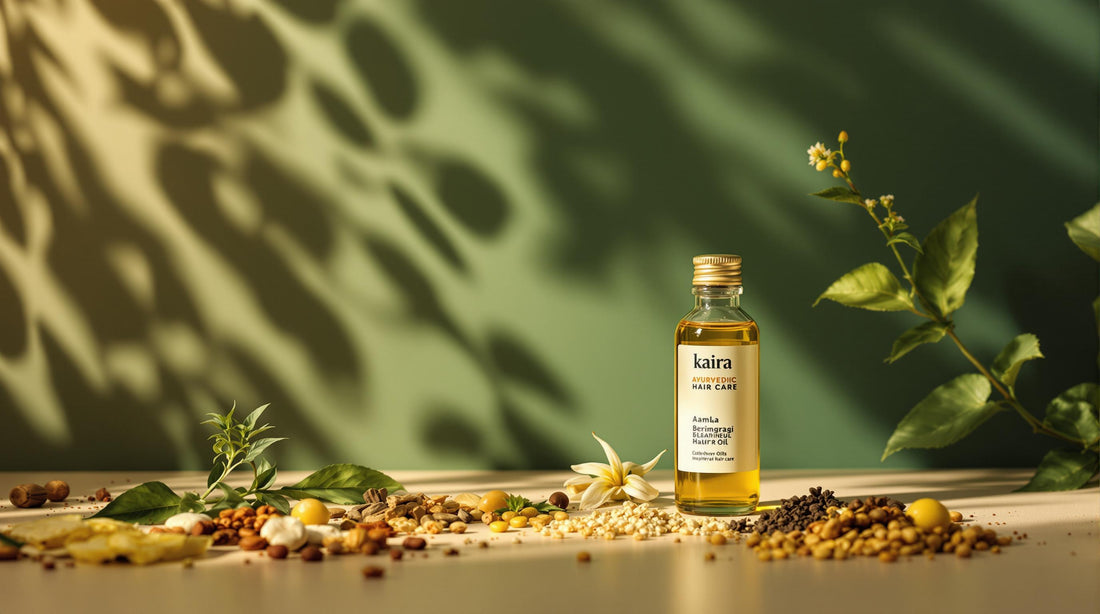
Natural vs. Chemical Haircare: Why Ayurvedic Products Are the Future
Want healthier hair without the risks of chemicals? Ayurvedic haircare might be the answer.
Chemical hair products often contain sulfates, parabens, and silicones, which may strip natural oils, irritate the scalp, and cause long-term damage like dryness and hair fall. In contrast, Ayurvedic products use natural ingredients like Amla, Neem, and Bhringraj to nourish hair from the roots, balance the scalp’s pH, and promote long-term health.
Key Points:
- Chemical Risks: Sulfates and parabens can lead to irritation, dryness, and buildup.
- Ayurvedic Benefits: Natural herbs strengthen hair, prevent damage, and support overall wellness.
- Eco-Friendly: Ayurvedic products are biodegradable and safer for the environment.
Quick Comparison:
| Feature | Chemical Products | Ayurvedic Products |
|---|---|---|
| Cleansing Agents | Sulfates (SLS) | Shikakai, Reetha |
| Preservatives | Parabens, Phthalates | Natural extracts |
| Moisturizing | Silicones | Botanical oils, Aloe Vera |
| Treatment | Synthetic compounds | Bhringraj, Amla, Neem |
| Environmental | Non-biodegradable | Eco-friendly, sustainable |
| Long-term Impact | Irritation, dryness, buildup | Stronger hair, balanced scalp |
Ayurvedic haircare combines natural ingredients, eco-conscious practices, and personalized solutions for every hair type. It’s a safer, sustainable choice for long-term hair health.
Chemical Hair Products: Risks and Effects
Common Chemical Ingredients
Most commercial hair products rely heavily on synthetic ingredients. For instance, over 95% of shampoos contain Sodium Lauryl Sulfate (SLS) as a primary component [2]. While SLS is an effective degreaser, it often dries out both the hair and scalp, leaving behind residue that can cause irritation.
Here are some common chemicals found in hair products and their potential effects:
| Chemical Type | Purpose | Potential Risks |
|---|---|---|
| Sulfates (SLS/SLES) | Cleansing/Foaming | Strips natural oils, leading to dryness, irritation, and inflammation [3] |
| Parabens | Preservation | May interfere with hormone levels and pose other health concerns [3] |
| Phthalates | Fragrance Fixing | Linked to hormone disruption and possible hair thinning [3] |
| DMDM Hydantoin | Preservation | Releases formaldehyde, which can cause allergic reactions and skin irritation [1] |
| Artificial Fragrances | Scent | Known to trigger allergies and exacerbate scalp issues [3] |
Immediate Results vs. Long-Term Risks
While some experts argue that ingredients like DMDM hydantoin are safe in regulated amounts, frequent use of chemical hair straighteners has been linked to an increased risk of uterine cancer, according to recent studies [1][4]. This highlights the potential dangers of repeated exposure, even to seemingly "safe" levels of certain chemicals.
Health and Safety Concerns
Using chemical-based hair products over time can lead to various health issues, including:
- Scalp burns, lesions, and persistent irritation
- Breathing problems and throat discomfort
- Clogged scalp pores and reduced natural oil production
- Long-term effects like brittle hair, thinning strands, and even baldness
For those with sensitive skin or conditions like chronic dermatitis, avoiding products with DMDM hydantoin is strongly recommended [1]. In the U.S., cosmetic products are currently allowed to contain up to 0.2% free formaldehyde and 0.6% formaldehyde-releasing agents [1]. However, starting July 2024, the FDA will prohibit formaldehyde in chemical hair straighteners [5].
Growing awareness of these risks has driven many consumers to seek out safer, plant-based alternatives. This shift in demand has opened the door to natural solutions, including Ayurvedic hair care.
Ayurvedic Hair Care: Natural Methods
Core Ayurvedic Concepts
Ayurveda views hair care as deeply connected to your body's unique constitution, or doshas - Vata, Pitta, and Kapha. Each person's hair type, color, and texture reflect their dominant dosha. Ancient Ayurvedic texts by Acharya Charaka and Sushruta explain: "Your hair type, colour, and texture depend on your dominant dosha and its influence on your body's metabolism" [7].
Unlike chemical treatments that focus only on surface issues, Ayurveda considers hair a byproduct of bone tissue, linked to both the nervous system and gut health [6]. This philosophy guides the use of specific herbs that work in harmony with your body.
Natural Ingredients and Their Benefits
Ayurvedic hair care relies on natural ingredients tailored to your dosha. These herbs address a variety of hair concerns while supporting overall scalp health. Here's a breakdown of how some key herbs work:
| Ingredient | Primary Benefits | Best For |
|---|---|---|
| Amla | Protects color, adds shine, balances Pitta | Preventing graying and hair fall |
| Bhringraj | Promotes growth, preserves natural color | Thinning hair, stress-related loss |
| Neem | Combats dandruff, regulates scalp oil | Oily scalp, fungal issues |
| Brahmi (Gotu Kola) | Soothes the scalp, nourishes hair follicles | Stress-induced hair loss |
| Shikakai | Cleanses gently, strengthens roots | All hair types, gentle cleansing |
Modern products often combine these time-tested ingredients for convenience. For example, Kaira Hair Care's Revitalizing Hair Oil ($34.99) blends several Ayurvedic herbs to nourish hair, while their Protein Mask ($44.99) focuses on strengthening strands using traditional remedies.
Complete Hair and Scalp Care
Ayurvedic hair care goes beyond topical solutions, integrating overall wellness to support healthy hair from within. To maintain strong, vibrant hair, Ayurveda recommends:
- Scalp Massage: Use warm herbal oil and massage your scalp for 30 minutes before washing.
- Gentle Cleansing: Wash with lukewarm water and use circular motions to avoid damaging hair.
- Natural Conditioners: Apply aloe vera gel or hibiscus paste for added hydration and softness.
- Dosha-Specific Diet: Include nutrient-rich foods that nourish hair and promote balance.
This comprehensive approach ensures that internal health reflects in your hair's appearance. Research backs these practices - a 2016 study found that just 4 minutes of daily scalp massage significantly boosted hair growth over 24 weeks [8]. Aromatherapist Madhavi Patel of Rishi Veda adds: "Aromatherapy connects the emotions and body, yielding profound holistic benefits" [8].
Best Skin Care & Hair Care Organic and Ayurvedic brands you can try
sbb-itb-5c7cdb5
Chemical vs. Ayurvedic Products
Looking at the risks of chemicals and the benefits of Ayurvedic care, a direct comparison makes it clear why natural options often stand out. Choosing between chemical and Ayurvedic products comes down to understanding their core differences.
Consumers are increasingly aware of ingredients, leading many to prefer Ayurvedic care. Kimi Jain, Co-Founder of Kimirica, shares: "This year, botanical oils are redefining sustainable hair care, offering a natural, eco-friendly solution for stronger, shinier locks. As consumers move away from chemical-laden formulas, plant-based oils like argan, jojoba, coconut, and sweet almond oils are becoming must-haves, delivering deep nourishment while being biodegradable and ethically sourced." [9]
Here’s a breakdown of how these products differ and their effects on hair health:
| Feature | Chemical Products | Ayurvedic Products | Impact on Hair Health |
|---|---|---|---|
| Cleansing Agents | Sodium Lauryl Sulfate (SLS) | Shikakai, Reetha | Chemical sulfates strip oils, causing dryness; natural cleansers preserve moisture. |
| Preservatives | Parabens, Phthalates | Natural extracts | Chemical preservatives may disrupt hormones, while natural alternatives offer gentler preservation. |
| Moisturizing | Silicones | Botanical oils, Aloe Vera | Silicones provide temporary smoothness but can cause buildup; natural oils nourish deeply over time. |
| Treatment | Synthetic compounds | Bhringraj, Amla, Brahmi | Chemical treatments often provide quick fixes, while Ayurvedic herbs address root causes. |
| Environmental Impact | Non-biodegradable | Eco-friendly, sustainable | Chemical products can harm waterways; Ayurvedic ingredients are biodegradable and safer for the planet. |
| Long-term Effects | Potential for scalp irritation and buildup | Improved scalp health, stronger hair | Chemical products may lead to lasting damage, while Ayurvedic solutions strengthen hair over time. |
For example, Kaira Hair Care's Purifying Shampoo ($19.99) uses Shikakai and Reetha instead of harsh sulfates. Their Magic Serum ($69.99) features traditional herbs like Bhringraj and Amla, steering clear of synthetic ingredients found in chemical products.
Sarah Raina, Co-Founder of Poshte, explains: "Ancient Ayurvedic tradition 'Shiro Abhyanga' - the Ayurvedic head massage, remains forever in trend. Shiro Abhyanga is a practice that offers countless benefits, not only for the hair but also for overall skin and soul wellbeing. Using natural oils such as sesame, coconut, or a blend with herbs, head massage promotes healthy hair growth by stimulating blood circulation to the scalp and improving hair strength." [9]
Chemical products may deliver quick results, but they often come with long-term issues, such as:
- Stripping natural oils, leading to dry, brittle hair
- Scalp irritation from harsh sulfates
- Hormonal disruption caused by parabens
- Buildup from silicones
On the other hand, Ayurvedic products offer a more sustainable approach to hair care by:
- Gently cleansing while maintaining the scalp's natural balance
- Strengthening hair follicles with nourishing herbal ingredients
- Providing chemical-free formulations that are safe for extended use
- Using biodegradable components that are better for the environment
Why Ayurvedic Hair Care Leads the Market
The organic and natural beauty market is on track to hit $54 billion by 2027, growing at an annual rate of 9.1% [11]. This surge is fueled by shifting consumer preferences, aligning perfectly with the benefits of Ayurvedic hair care.
Growing Demand for Natural Products
Consumers are increasingly seeking products free from harsh chemicals. In fact, 82% now use more "clean" products, and 72% place a higher value on clean beauty compared to last year [10]. This trend has propelled brands like Kaira Hair Care, known for their natural formulations, into the spotlight.
Eco-Friendly Practices in Focus
In addition to clean ingredients, eco-conscious practices have made Ayurvedic products even more appealing. Unlike many conventional brands, Ayurvedic companies prioritize environmental responsibility. Here's how:
| Practice | Market Impact |
|---|---|
| Biodegradable Ingredients | Safely decompose, reducing water pollution |
| Ethical Sourcing | Protects plant species and supports local communities |
| Eco-Friendly Packaging | Uses recyclable materials to minimize waste |
These practices not only reduce environmental harm but also resonate with the growing number of eco-conscious consumers.
Tailored Solutions for Every Hair Type
Ayurvedic hair care stands out by offering personalized solutions for all hair types. Here's how it addresses specific needs:
- Vata Hair (Dry and Frizzy): Ingredients like Methi and Aloe Vera help combat dryness and split ends. Example: Intense Hydration Mask ($39.99).
- Pitta Hair (Sensitive and Graying): Hibiscus and Brahmi soothe sensitive scalps and delay premature graying.
- Kapha Hair (Oily and Dandruff-Prone): Shikakai and Neem naturally reduce excess oil and dandruff.
This tailored approach, combined with the emphasis on natural and eco-conscious solutions, solidifies Ayurvedic hair care's position as a leader in the beauty market. With more consumers prioritizing sustainable and holistic hair care, its influence is only set to grow.
Conclusion
Ayurvedic hair care is carving a path as a leading approach to long-term hair wellness. This shift represents a deeper focus on sustainable and natural solutions for maintaining healthy hair.
Main Points
Ayurvedic hair care offers a well-rounded method for improving hair health. Here's a quick look at its standout benefits:
| Aspect | Ayurvedic Benefits | Long-term Impact |
|---|---|---|
| Scalp Health | Detoxifies naturally and balances pH | Promotes stronger growth, reduces hair fall |
| Hair Structure | Provides nourishment from root to tip | Enhances thickness and reduces breakage |
| Environmental Impact | Uses biodegradable ingredients and ethical sourcing | Leaves a smaller ecological footprint |
These benefits highlight why Ayurveda is a natural, effective alternative to chemical-based hair care.
"Ayurveda-based personal care is beyond a passing fad. It is the future of the beauty industry. It espouses natural healing, sustainable lifestyles, and personalized care to provide a holistic approach to beauty in accordance with modern consumer demands." – HRR [11]
Ayurvedic treatments focus on addressing the root causes of hair issues, delivering noticeable results in just 4–6 weeks [12]. Unlike quick fixes, these treatments align with individual doshas, working with the body’s natural rhythms to create a strong foundation for healthy hair [13]. This personalized approach ensures lasting improvements, making it a standout choice for hair care.
